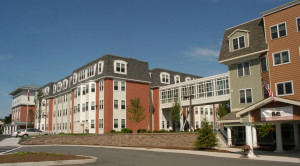
As of September 1, 2016, the Somerville Housing Authority will adopt smoke-free policies to protect residents from secondhand smoke. Because smoke drifts between units and cannot be contained, the only viable solution to the issue of secondhand smoke is for buildings to go entirely smokefree.
According to the United States Department of Housing and Urban Development (HUD), 20% of countrywide public housing units have already become smoke-free.1 With a new proposed rule for every public housing unit to be smoke free,2 Somerville Housing Executive Director Joseph Macaluso believes Somerville has the great task of protecting its public housing residents from secondhand smoke and its effects. According to the United States Surgeon General, by going smoke-free, residents of each of the Somerville Public Housing Authority buildings, including both family and elderly/disabled housing, will be less likely to suffer from the effects of secondhand smoke, which include acute respiratory infections, ear problems, asthma, heart attacks, and certain cancers.3
Management assessed survey results of Somerville Public Housing Residents from 2013, and found that the majority of residents were interested in making housing smoke-free. The Somerville Housing Authority resident services staff will be holding meetings in the coming months, in collaboration with health and tobacco cessation professionals from the Cambridge Health Alliance, Health Resources in Action, and the Six City Tobacco Initiative, a division of the Somerville Department of Health and Human Services. These meetings will be an open forum for residents to discuss the policy and a chance for resident service staff and health professionals to relay cessation resources available.
With its new rule taking effect on September 1, 2016, The Somerville Housing Authority will join the rapidly rising number of public and private multi-unit housing properties throughout Massachusetts with smoke-free policies. This positive trend has the intention of protecting residents from the serious health effects of breathing secondhand smoke and promoting the health of whole communities.
For more information, please contact Joseph Macaluso, Somerville Housing Authority, 617-625-1152
__________________________________________________
1 Markon, Jerry, and Lisa Rein. “HUD Proposes Smoking Ban in Public Housing, Citing Dangers of Secondhand Smoke.” Washington Post. November 15, 2015.
2 “HUD SECRETARY CASTRO ANNOUNCES NEW RULE MAKING PUBLIC HOUSING SMOKE-FREE, Proposed Rule Open for Public Comment for 60 Days.” U.S. Department of Housing and Urban Development. November 12, 2015. http://portal.hud.gov/hudportal/documents/huddoc?id=smoke-freepublichousing.pdf.
3 The health consequences of involuntary exposure to tobacco smoke: a report of the Surgeon General. – [Atlanta, Ga.]: U.S. Dept. of Health and Human Services, Centers for Disease Control and Prevention, Coordinating Center for Health Promotion, National Center for Chronic Disease Prevention and Health Promotion, Office on Smoking and Health, [2006]














Good luck trying to enforce this. What will the penalty be, if you can even prove who was doing the smoking from which unit.
Makes sense to me, most people I know renting units have a no smoking clause in their lease to begin with.
It’s simple, you kick them out.
In 2011, the Boston Housing Authority went “smoke free” and there hasn’t been a single eviction due to the fact that it’s next-to-impossible to enforce, and project managers really don’t care due to the fact that there are far more important issues to address within housing developments (i.e., crime, bed bugs, roaches ect.).
In 2014, the Cambridge Housing Authority went “smoke free” but created a four strike policy:
1. Verbal Warning
2. Written Warning
3. Sit Down Meeting
4. Right to Request a Hearing Before a Judge
In concluding, in-home “smoke bans” are a blatant violation of an individual’s civil liberties and right to privacy.
Whether it’s a subsidized unit in the projects or a mansion on Brattle Street just outside of Harvard Square, a man’s home is still a man’s castle.
Uh…no. When a man shares a castle with others equally he has a responsibility to not endanger their health or cause them significant discomfort. Really dumb.
Thanks for sharing the information..